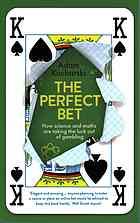
The Perfect Bet
How Science and Math Are Taking the Luck Out of Gambling
کتاب های مرتبط
- اطلاعات
- نقد و بررسی
- دیدگاه کاربران
نقد و بررسی

January 11, 2016
On first blush, Kucharski, a lecturer at the London School of Hygiene and Tropical Medicine, would seem out of his comfort zone with this detailed exploration of how mathematics and physics operate in the world of gambling. However, he makes clear that the principles of mathematical modeling—the ways myriad variables can be used to predict outcomes—can be profitably transferred to the world of games of chance. Kucharski begins with a brief history of failed searches for the gambler’s holy grail, which would be an infallible system, and then delves into modern mathematically based strategies that can shift the odds in the bettor’s favor. Among the strategies he deconstructs are card counting, the calculation of the physics of a roulette wheel’s spin, online poker-playing bots, and the ultrasophisticated algorithms employed to handicap horse races, soccer, and football. Kucharski’s straightforward writing and attention to the fundamentals of the business of gambling, and the quirky personalities of the players who craft the strategies, successfully balance the drier descriptions of the underlying mathematics. The conjunction of the multibillion dollar gambling industry and mathematics brings together Ph.D.s, Las Vegas gamblers, and investment bankers, and though readers looking for an edge might be disappointed, Kucharski delivers a fascinating read. Agent: Peter Tallack, Science Factory.

December 15, 2015
A lucid yet sophisticated look at the mathematics of probability as it's played out on gaming tables, arenas, and fields. Scissors cut paper, rock smashes scissors, paper covers rock: we all know the game, and some of us have a sense of when to play which of the three choices. Game theory, writes Kucharski (London School of Hygiene and Tropical Medicine), would hold that the optimal strategy is simply to choose randomly, by which you would come out even in the long term. However, most of us are more predictable than that: if we win with rock over scissors, then we'll choose rock next time. We may shift our strategies, but we're not playing randomly--and in any event, Kucharski observes, "the irony is that even truly random sequences can contain seemingly nonrandom patterns." Sure, card counting works to some extent, but most mathematical behavior is a kind of learned guesswork and a lot of hunch playing. The author doesn't reveal secrets of winning so much as he looks at the myriad ways the math is working against us. "Finding a biased roulette wheel," he notes by way of example, "isn't the same as finding a profitable one," but even so, finding a roulette wheel that "churns out numbers that are uniformly distributed" generally requires collecting a vast body of information about that wheel, something that computers are better at doing than people. The same is true at the parimutuel racetrack, the boxing ring, and every other venue for wagering: having sufficient information is key to making any sort of bet that isn't a mere stab in the dark. Even the most seasoned of bettors is thus usually to be found somewhere along what mathematicians call Poincare's third level of ignorance. Kucharski's book, which necessarily oversimplifies an extremely complex subject, is no cure for that ignorance, but gamblers and math buffs alike will enjoy it for its smart approach to real-world problems.
COPYRIGHT(2015) Kirkus Reviews, ALL RIGHTS RESERVED.

























دیدگاه کاربران